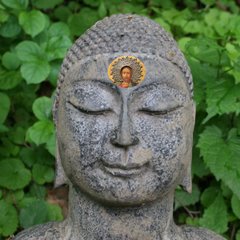Saturday, April 23, 2011
What is necessary and what is possible
Tuesday, April 19, 2011
A subtle work
 This work of living is a subtle work.
This work of living is a subtle work. Wednesday, April 13, 2011
An unerring sense of gratitude
Tuesday, April 12, 2011
River, Dog, Hill
Monday, April 11, 2011
The blind watch breaker
Monday, April 4, 2011
Stop
Saturday, April 2, 2011
Entertainment value
Thursday, March 31, 2011
Presumptions
Monday, March 28, 2011
establishing relationship
Friday, March 25, 2011
impressions from the field
Sunday, March 20, 2011
The act of unknowing

Saturday, March 19, 2011
Formless forms, and mushianism

I'm on the road again, travelling in China. As always, the change of surroundings has provoked new impressions, a change in tempo.
Before I left the USA, I picked up a copy of "Notes on The Next Attention" by Fran Shaw. I very highly recommend this book to all readers. It carries the authentic flavor of inner work as it's practised today... a book, if you will, "outside the realm of books." It's an essential companion to "The Reality Of Being," since it traces the direction forward from Jeanne De Salzmann's work into the present. It's a breath of fresh air for those interested in "non-technical" Gurdjieffian practice, and a taste of where we are if we are willing, for a moment, to allow ourselves the freedom to throw away the book "In Search Of The Miraculous" and actually engage in a search for the miraculous.
It's in there.
This leads me into a subject I have been pondering for some weeks- that is, the question of form. The tension between form and "no-form" continually arises, as we walk the line between effort- all of which is attached to form of one kind or another, struggle as we may to free ourselves from that web- existence, which clearly has a form (although that form itself is creative and ever-evolving, mediated through the direct experience of life)- and the unknown, which is inherently formless.
So here is my own formulation to define the territory between form and the abandonment of form:
Effort leads us through experience, and into the unknown.
That is, essentially, how the game plays itself out, inwardly and outwardly. n'est ce pas? I'm reminded of how Persian fairly tales might state it: "once upon a time, there was a form, and there wasn't a form."
Perhaps we can understand the idea of form and its place (or lack of place) a bit better by understanding form in terms of levels.
Our own form, as we are, on this level, both inwardly and outwardly, takes on a shape defined (as Gurdjieff explained it) by forty-eight laws. So there must be a lawful form and order according to level: if there truly were no form, there could be no universe. One must recognize here that a complete lack of form would require us to throw away every conceivable cosmology, including Gurdjieff's, and propose a universe of pure mush. Mushianism, if you will. Bliss-filled mush, perhaps, but mush nonetheless.
For those of us who don't believe in Mushianism, a working proposition might be as follows: form is an emergent property of level- that is, the convergence of the laws applying to a particular level (for the level "above" us, for example, twenty-four laws) create the form for that level. Levels are separated by a divergence of form: what that means is that the form we dwell in within our own level is not capable of recognizing, understanding or digesting the form of the levels above us.
This means, in essence, that for any Being, on any given level, a relationship with a higher level involves a relationship with a higher level of form which cannot be recognized: hence, for all intents and purposes, the level above us is "formless." That is to say, it is incomprehensible to us as we are.
That doesn't mean it does not exist: it only means that it isn't accessible to us. Only by abandoning all of our formed assumptions about it might it become possible to leave an inner opening that might allow a new degree of contact.
Is this information at all practical? Hints of it abound. Today I was driving from Shanghai to Nantong, and saw a man selling oranges from a cart. For one second, somehow, I was touched by this impression in parts that canot be described or redacted: no analysis applies. All I can say is that I saw this man, these oranges, in such a way that it transcended all my assumptions about the form of this level. It was filled with content that does not exist; it carried vibrations, information, feeling that does not fit into our usual context. And indeed, all legitimate religious experience falls into this category: the transcendence of form, of this order, so that a NEW order may be perceived.
All of that from the most ordinary events- which are, indeed, absolute embodiments of the divine.
It isn't disordered. It isn't formless. The abandonment of form actually involves embracing an entirely new form: formless relative to the form we know, yes, yet very fully formed indeed.
At the risk of sounding a good bit too clever: as Christ put it, new wine must go in new bottles;
but there are still bottles.
May our prayers be heard.
Sunday, March 6, 2011
On the Origins of Life
 Everyone
who reads in this space is well aware of the fact that I am a firm
supporter and devoted follower of the work principles that Jeanne
DeSalzmann brought to us when she carried on in Gurdjieff's footsteps.
She was, however, intensely focused on the practical aspects of inner
work–as perhaps she should have been. We don't see evidence from her of
an interest in the sciences on the same order as what Gurdjieff brought.
Everyone
who reads in this space is well aware of the fact that I am a firm
supporter and devoted follower of the work principles that Jeanne
DeSalzmann brought to us when she carried on in Gurdjieff's footsteps.
She was, however, intensely focused on the practical aspects of inner
work–as perhaps she should have been. We don't see evidence from her of
an interest in the sciences on the same order as what Gurdjieff brought.






